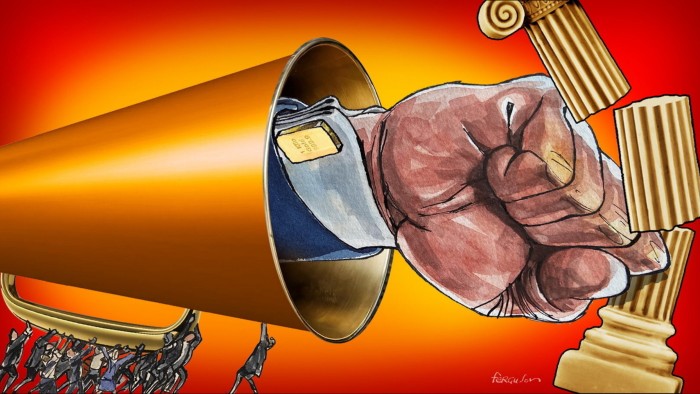Unlock the Editor’s Digest for free
Roula Khalaf, Editor of the FT, selects her favourite stories in this weekly newsletter.
We live in an age of populist demagogues. This is not a new phenomenon. Plato used the word “demagogue” in his critique of democracy in The Republic. He was correct that demagogy is the Achilles heel of democracy. We are seeing this threat in many countries today. Donald Trump, the US president, is a classic rightwing populist demagogue.
As my colleague Joel Suss noted recently, populism is economically, as well as politically, damaging. How damaging is illustrated by the fate of Argentina, a country that has been plagued by populism since the rule of Hipólito Irigoyen in 1916. Since then its real GDP per head has halved relative to that of the US and gone from five times Brazil’s to one and a quarter times. (See charts.)
The illuminating paper to which Suss refers — “Populist Leaders and the Economy” by Manuel Funke, Moritz Schularick and Christoph Trebesch — focuses on these economic effects. Following today’s consensus, the paper asserts that, “Populists place the narrative of ‘people vs elites’ at the center of their political agenda and then claim to be the sole representative of ‘the people.’” By definition, they claim, those who are against them are “enemies of the people”. Populists may not be dictators. But, since Hitler is rightly on this paper’s list, they certainly can be.
The paper’s dataset covers 60 countries from 1900 (or independence) to 2020. It also represents 95 per cent of world output both in 1955 and 2015, as well as 1,482 leaders, some more than once. It reveals several realities. In 2018, populism reached a political peak. Again, if a country has had a populist leader once, it is more likely to have another one. Economic crises make populist rule more likely. Populists also tend to survive in office for an average of eight years, twice as long as non-populists. Crucially, few populists exit by losing elections. But left- and rightwing populists show similar patterns of entry, survival and exit. Finally, Latin America and Europe have historically been the two homes of populist politics.
The most important conclusion of the analysis is the least surprising. Populism is often triggered by bad economies, but then makes what is already bad still worse. This is true of both the left- and rightwing varieties. The former attacks economic elites; the latter assails foreigners, minorities and the political elites who protect them. Both are damaging to economies, although the leftwing variety is more economically damaging than the rightwing one. Fifteen years afterwards, real GDP per head in countries that succumbed to leftwing populism is around 15 per cent lower than it would otherwise have been; under rightwing populism, the equivalent loss is some 10 per cent.
The leftwing variant favours more taxation, regulation and redistribution, while the rightwing one favours economic nationalism, notably protectionism. Rightwing populism is, predictably, the form favoured by the wealthy. Inevitably, too, rightwing populism exploits cultural concerns. But it would be a mistake to conclude that these are its principal causes, since cultural complaints are also a diversionary tactic. While left- and rightwing varieties do indeed differ, they are similar in one essential respect, namely their hostility to independent institutions, such as courts, universities or central banks. On this, left- and right- wings converge.

Populist demagogy, in sum, is, as Plato warned two and a half thousand years ago, a dangerous disease of democracy. It is economically damaging, via its tendency to lead to policies that are appealing in the short term and damaging in the long term. It is often long-lasting as well, thereby increasing the damage. Crucially, it harms core institutions of a liberal society, polity and economy, notably the rule of law, which is the bulwark of both freedom and democracy. In these ways, populism also impairs both confidence and credibility.

The twin facts that populist regimes tend to be both long-lasting and recurring are particularly concerning. In this respect, the plight of today’s Argentina is highly relevant. President Javier Milei is, to put it mildly, not the first leader to try to pull the country out of its long-term economic decline. Moreover, just like his many predecessors in this role, he now finds himself on the brink of failure.
I share the view of Maurice Obstfeld, former chief economist of the IMF, in a recent paper that Milei’s exchange-rate-based disinflation plan is unlikely to work. Such schemes rarely do. Matt Klein makes similar arguments. Argentina lacks the national commitment, resources or credibility to pull it off. It could be successful if Trump would make an open-ended commitment to do “whatever it takes”, as then ECB president Mario Draghi did in 2012. But he surely will not. This US administration has started a trade war on Brazil. Why should it view Argentina as a vital strategic interest? The money on offer may save a few hedge funds. But it will not save Argentina.

What needs to be restored is the country’s economic stability and growth. These must then last long enough to build confidence in domestic and foreign entrepreneurs and investors. After so many defaults and failed efforts at stabilisation and reform, this cannot be done overnight. Nobody so far has kept a mandate in Argentina long enough to achieve this. Will Milei’s fate be any different?
Nor is this just about a legacy of fiscal and monetary profligacy. Just look at the difficulty Poland’s Donald Tusk is having in undoing the damage to the rule of law that he inherited. Similarly, Trump’s legacy will not disappear even if Maga is defeated in an election. What populists have destroyed cannot easily be restored. Just ask the Argentines.











